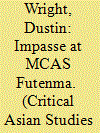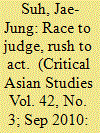|
|
|
Sort Order |
|
|
|
Items / Page
|
|
|
|
|
|
|
| Srl | Item |
| 1 |
ID:
098399


|
|
|
|
|
| Publication |
2010.
|
| Summary/Abstract |
What has distinguished anthropology from the other social sciences is an immersion in sustained fieldwork, itself premised on different kinds and levels of lived and shared experiences, usually with hitherto strangers in another culture in an often distant geographical location. In 2005 the U.S. Department of Defense inaugurated the experimental Human Terrain System, which embeds social scientists with combat brigades to enhance "operational effectiveness" and, supposedly, to reduce civilian casualties. A consensus is emerging among concerned anthropologists that ethnographic fieldwork abroad and within a broad spectrum of military activities and actors can, and must, be employed to challenge the U.S. Army's alarmingly naive concept of "weaponizing culture." The constituent essays in this thematic collection on the vicissitudes of the relationship between war and anthropology take up and complicate the premises of this challenge.
|
|
|
|
|
|
|
|
|
|
|
|
|
|
|
|
| 2 |
ID:
098397


|
|
|
|
|
| Publication |
2010.
|
| Summary/Abstract |
This article compares the development experiences of two societies - Kerala (a state within India) and Cuba-both widely regarded by development experts as "success stories" in the Global South for their relatively high achievements in general quality of life and social well-being as measured by UN Development Program's indicators of human development. The author argues that the lessons offered by Kerala and Cuba in rapidly alleviating endemic deprivations and enhancing human development are of enormous significance for developing countries. Indeed their experience is of particular relevance in the context of the structural adjustment programs imposed on southern countries by the Bretton Woods institutions and in the wake of the clear failures of alternative models to reduce hunger and deprivation. Examining the historical trajectory of these two "models" and the transformative practice that produced relatively high human development outcomes, the article identifies some common elements behind their success, highlighting the centrality of public action and organized democratic participation. It also examines some of the major challenges Kerala and Cuba face in the aftermath of globalization and market reforms. Although they have been successful in achieving higher economic growth, Kerala and Cuba now confront problems created by privatization, increasing inequality, and eroding public services that threaten their development models. While the two societies are facing these challenges in different ways and are still sustaining their basic social welfare programs, their experience in meeting these challenges is important for the developing world facing similar challenges.
|
|
|
|
|
|
|
|
|
|
|
|
|
|
|
|
| 3 |
ID:
098400


|
|
|
|
|
| Publication |
2010.
|
| Summary/Abstract |
In 1960, a Japanese prime minister was forced to resign after he committed Japan to an unpopular security relationship with the United States. In 2010, exactly fifty years later, the security relationship with the United States, centered on the stationing of a vast U.S. base complex in Japan, has unseated a prime minister who came to office just last year with an over 70 percent approval rating. In the small southern prefecture of Okinawa, where 75 percent of the U.S. military in Japan is stationed, the continued presence of the unpopular Futenma air base has become a lodestone for Okinawan frustration. High-level talks to remove Futenma from the crowded city of Ginowan have been ongoing since 1996, yet nothing has been accomplished. On 25 April 2010, an estimated 90,000 people rallied in Okinawa and demanded the base be removed from the prefecture completely, and not simply relocated to a location near the city of Nago. This essay attempts to explain Washington's central role in creating the problem and argues that Futenma is an unnecessary burden on the people of Okinawa and on cash-strapped Japanese and American taxpayers.
|
|
|
|
|
|
|
|
|
|
|
|
|
|
|
|
| 4 |
ID:
098396


|
|
|
|
|
| Publication |
2010.
|
| Summary/Abstract |
Singapore's ruling elite runs a finely calibrated system of social and political control based on a mixture of monitoring and repression by the state, and self-monitoring and self-restraint by all elements of civil society. This system matured under Goh Chok Tong's premiership in the 1990s but its template was created by Prime Minister Lee Kuan Yew in the final years of his premiership with his handling of a fresh upsurge of social justice activism and dissent that was becoming increasingly brave. In response to these challenges he created a fanciful narrative about a "Marxist conspiracy" to overthrow the state and centered the main force of his allegations on a group of activists who were associated with the local Catholic Church. He accused them of being Marxists who had been subverted by the teachings of liberation theology and used the Internal Security Act to detain them and destroy their rather modest and innocent operations; their treatment provided both an exemplar to other groups and a model for the next generation of the ruling elite to follow. This article uses archival, oral, and secondary sources to build an account of these events with a particular focus on the motivations and activities of this group of Catholics and the motivations of the government-which essentially means the motivations of Lee Kuan Yew.
|
|
|
|
|
|
|
|
|
|
|
|
|
|
|
|
| 5 |
ID:
098398


|
|
|
|
|
| Publication |
2010.
|
| Summary/Abstract |
On 26 March 2010, the Republic of Korea (ROK) Navy corvette Cheonan broke in half and sank near Baekryong-do Island off the coast of North Korea. Forty-six sailors lost their lives. Mysterious as the cause of the incident is, the ROK government's responses-the Navy's failure to communicate through the chain of command, the military's incompetence in rescue and salvage operations, the Ministry of National Defense's efforts to cover up basic facts, and the government's rush to blame North Korea as the culprit and take punitive measures-all added confusion and heightened already high tensions on the peninsula. This articles argues that the ROK government's report failed to substantiate its claim that North Korea attacked and sank the ship. Moreover, the author shows, its claim was based on internally inconsistent logic and likely fabricated data. The government's rash, and unsubstantiated, judgment was accompanied by saber-rattling against the North and scare tactics intended to silence domestic critics immediately before local government elections. Amidst the heightened tension caused by the incident, the U.S. administration succeeded in pressuring the Japanese prime minister Hatoyama to cave in to its demand to keep the Futenma base within Okinawa. Also it agreed to postpone the transfer of the wartime command control over the Korean military to the ROK until 2015. The United States, economically wounded by the financial crisis of 2008, found the heightened state of insecurity created by the Cheonan incident an opportune excuse to strengthen its allies and its military, if not political, influence in Northeast Asia, although its success may prove Pyrrhic in the long run.
|
|
|
|
|
|
|
|
|
|
|
|
|
|
|
|
|
|
|
|
|